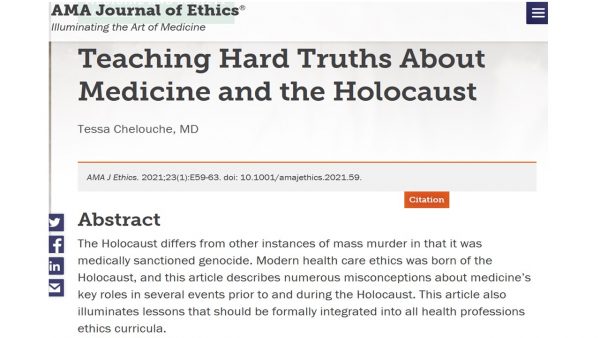Ethics is frequently taught by referring to reference cases, moral dilemmas and readings on the evolution of the discipline as some ethical issues arise due to technological innovations. Some fundamental ethical principles pertain to professional standards or so-called codes of conduct. This is also part of the sociology of professions which includes the societal and political role professions and professionals. The medical profession has been subject to ample research already. And yet it is important to notice that there is a renewed effort to include into the teaching of ethics “The hard truths about medicine and the Holocaust”. (AMA J Ethics. 2021;23(1): E59-63. doi: 10.1001/amajethics.2021.59). Eugenics were practices well before WWII. “Legal coercive sterilization, which progressed to the notorious “euthanasia” (medically sanctioned murder) program” (p.59) were the beginning. Medical doctors were not reluctant to implement the Nazi medical doctrines. “Most joined eagerly, earlier, and in much greater numbers than other professionals” (Chelouche, 2021; Kater MH, 1989). Physicians made the horrors of Nazi ethics efficient in its implementation. Nazi physicians had a strict ethical code which priorities obedience to the state rather than to the individual.
Research and experiments conducted by medical doctors during Nazi rule is analysed by Weindling (2015). In summary he states “Nazi experiments were accepted forms of science at the time, conducted not only in concentration camps but also in hospitals and clinics across Germany”. This concise overview of recent research by Tessa Chelouche in this field is not only important to teaching ethics in the medical and care professions, but it is of high relevance to much broader audiences and many more professions like judges. Only the awareness and guarding against a renewed failure to respect human values and human rights of the individual allow us to advance humanity. Decentralisation of power, checks and balances, professions following widely accepted principles rather than authoritarian rules can avoid another failure. Teaching about this is a “conditio sine qua non” and not a nice to have part of the curriculum in schools as well as professional colleges. 

